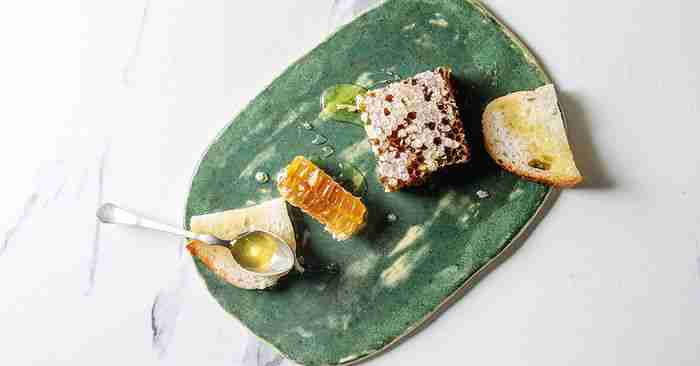Frequently Asked Questions - Health
Frequently Asked Questions - Health

Frequently Asked Questions (on Propolis & Royal Jelly):
What is propolis?
Besides, honey, bees also produce a compound called propolis from the sap on needle-leaved trees or evergreens. When they combine the sap with their own discharges and beeswax, they create a sticky, greenish-brown product used as a coating to build their hives. This is propolis.
Thousands of years ago, ancient civilizations used propolis for its medicinal properties. Greeks used it to treat abscesses. Assyrians put it on wounds and tumours to fight infection
What is Royal Jelly?
Royal jelly is a gelatinous substance produced by honey bees to feed the queen bees and their young. It is frequently sold as a dietary supplement to treat a variety of physical ailments and chronic diseases.
and help the healing process. Egyptians used it to embalm mummies.
What do medical researchers say about propolis?
Researchers have identified more than 300 compounds in propolis. The majority of these compounds are forms of polyphenols. Polyphenols are antioxidants that fight disease and damage in the body. Specifically, propolis contains the polyphenols called flavonoids. Flavonoids are produced in plants as a form of protection.
Can we use propolis for burns or wounds?
Propolis has a special compound called pinocembrin, a flavonoid that acts as an antifungal. These anti-inflammatory and antimicrobial properties make propolis helpful in wound healing. One study found that propolis can help people who have had traumatic burns heal faster by speeding up new healthy cell growth. Another study found that propolis alcoholic extract was more effective than a steroid cream in reducing mast cells in oral surgery wounds. Mast cells are associated with inflammation and slowed wound healing.
What is the difference between Propolis 500mg and Propolis 5000mg?
One capsule of 5000mg equals to 10 capsules of 500 mg. Both use vegetable oil to carry the Propolis within a Softgel Capsule. Propolis 5000mg contain total Flavonoids of 60mg per capsule.
What is the difference between Propolis Sprays and Propolis Extract?
They taste differently, propolis spray contains manuka honey so it tastes sweeter than the extract. For the spray, you can swallow it, for the extract, better to gargle as it contains alcohol. For the extract, you can apply to the cuts directly.
Is propolis safe if I have allergy to bee products?
People typically take in some propolis when they eat honey. However, if you have an allergy to honey or bees, you will also have a reaction to products containing propolis. Propolis may also cause its own allergic reaction when used for a long time. The typical allergic reaction is an eczema-like skin breakout. Talk to your doctor before taking propolis, especially if you have existing allergies or asthma.
Can I take Propolis, Royal Jelly and Omega 3 at the same time?
It’s better to consult your Doctor as taking too much supplement may give your kidney extra burden.
Can I take Propolis, Royal Jelly and Omega 3 at the same time?
It’s better to consult your Doctor as taking too much supplement may give your kidney extra burden.
Can pregnant women take Propolis?
Pregnancy and breast-feeding: There isn't enough reliable information to know if Propolis is safe to use when pregnant or breast-feeding. Stay on the safe side and avoid use. Consult your doctors.
Frequently Asked Questions (on Omega 3 & Colostrum):
Is Omega 3 a good health supplement if you don’t like fish?
Both the New Zealand Heart Foundation and the American Heart Association recommend that everyone eats fish (particularly fatty, cold water fish) at least twice a week. Salmon, mackerel, herring, sardines, lake trout, and tuna are especially high in omega-3 fatty acids. While foods are your best bet for getting omega-3s in your diet, fish oil supplements are also available for those who do not like fish. Taking up to 3 grams of fish oil daily in supplement form is considered safe. Don't take more than that unless you discuss it with your doctor first.
Can I take Propolis, Royal Jelly and Omega 3 at the same time?
It’s better to consult your Doctor as taking too much supplement may give your kidney extra burden.
Can pregnant women take Propolis?
Pregnancy and breast-feeding: There isn't enough reliable information to know if Propolis is safe to use when pregnant or breast-feeding. Stay on the safe side and avoid use. Consult your doctors.
Can children take colostrum tablets?
Not suitable for children under 3 due to choking hazard.
Can pregnant women take Omega 3?
Should be helpful as it contains DHA but better consult your doctor.
The Power of Bees: Scientific Benefits of Bee Propolis
Not only do Bees pollinate our flowers, but they provide fantastic edible compounds, with some great health benefits for humans!

Today we’re teaching you all about propolis – a true superfood that is not to be confused with honey.
What is Bee Propolis?
This is probably your first question, since propolis hasn’t received the attention it deserves.
Imagine honey, but it’s packed with health benefits, zero-sugar, and you don’t put it on your oatmeal. Okay it’s nothing like honey, but it comes from bees and it’s going to provide you with serious nutritional benefits.
Propolis is a resin that bees use to build their hive and, because of that, it has powerful anti-microbe and anti-tumour benefits.
Bee-autiful: Bee-Based Nutrition
Bees are truly nature's miracle workers. They produce various edible compounds which provide numerous nutritional benefits, so we’ll break them down for you quickly, and you can see how they benefit you and what they’re for.
Honey is the obvious one: it’s a concentrated, high-sugar sweetener that bees use to produce their hives and feed their young.
This is the glamorous product – it tastes great but it’s all sugar. You’ll find some phytochemicals in honey, but it doesn’t provide much actual benefit, being a pure-sugar food.
Bee Pollen is another superfood that is growing in popularity. It is essentially a mixture of pollen, saliva, nectar or honey that is fermented and fed to the bee colony. Studies show that it possesses many health benefits including antioxidant power.
Royal Jelly is another bee-based edible compound that is a great source of vitamins, minerals, proteins, fatty acids and amino acids.
Propolis is the important one we’re going to talk about today. It’s a type of glue-like substance that bees produce to hold hives together. This is the most nutrient-rich compound and isn’t used in the same way as honey.
Nutritional Benefits of Bee Propolis
The main benefits of propolis are about wellbeing and preventing illness. You’ll experience some positive benefits, but a large part of it is maintenance: preventing infections, tumours, and similar issues.
These are tied to the compounds in propolis that are antibiotic, anti-fungal, anti-viral, and anti-tumour! These are some of the most common – as well as the most concerning – health problems we face.
This isn’t just another “wellbeing” product – the science is all positive for propolis :
“Unlike many ‘natural’ remedies, there is a substantive database on the biological activity and toxicity of propolis indicating it may have many antibiotic, antifungal, antiviral and anti-tumour properties”
Unless you have an existing allergy to bees - or their by-products - there are no known side effects associated with propolis!
Nutritional Composition
You can easily take advantage of all the benefits of natural bee propolis with an easy, convenient supplement.
An effective propolis formula is fortified with vitamins and minerals
Vitamin C improves the production of key tissues in the body (especially in the joints), and even helps you absorb more iron. Getting this with a well-balanced, mixed meal can be a big boost.
Zinc is a key mineral in a variety of biological processes, but the main ones involve regulating your hormones and keeping energy levels regular.
Other Potential Benefits
On top of the proven benefits mentioned above, recent research is only looking to further the confirmed health benefits of propolis.
One of the most interesting benefits we’ve seen research into is anti-inflammation. Not only is this a general benefit, but it seems to be specifically useful to cardiovascular health – the number one killer in the English-speaking world.
Protecting your heart and arteries with propolis is a great way to reduce the risk of degenerative chronic disease. If you’re looking to live a better quality of life for longer, this is a great addition to your lifestyle.
Final Thoughts: Getting the most from propolis
The first step to getting the best results is to choose a high-quality Propolis source.
You should also take care to use Propolis in combination with other key compounds – usually with food. This improves the utilisation of iron and other compounds, while making the most of the other compounds in a good propolis supplement.
Take two softgel capsules with a light meal in the morning, and a single capsule later in the day for maximum effect. This benefits and rapid uptake of key compounds to support longer-duration benefits!
-
About the author: Liam Rodgers is a health, fitness and sports science expert from the United Kingdom.
This Bee Product Has Surprising Health Benefits, and It's Not Honey
Many people credit honey as a byproduct of bees, but did you know these little stingers produce another equally beneficial substance called propolis? Propolis is a compound that bees create from sap on needle-leaved trees. When it's combined with their discharge, beeswax, and pollen, another sticky compound, propolis is formed.

This healing ingredient traces back to 300 BC, when Aristotle supposedly coined the term propolis, which means "defender of the city." It has been used widely across different cultures, including the Egyptians (Cleopatra was a big fan!), Incans, and more. In the 17th century, propolis was listed in the London Pharmacopeias as the official drug to treat wounds. Given its long-standing history of treatments and results, propolis has stood out in the test of time.
"The result is a sticky substance that is used to line the hive walls. Because it is packed with powerful phytochemicals that protect against germs and intruders, it essentially functions as the hive immune system," explains Carly Stein, CEO and founder of Beekeeper's Naturals. "They line every inch of the nursery with propolis to keep baby bees healthy and clean. They even keep a special propolis 'doormat' by the entrance of the hive to ensure no germs are tracked in as the bees bustle in and out of the hive."

